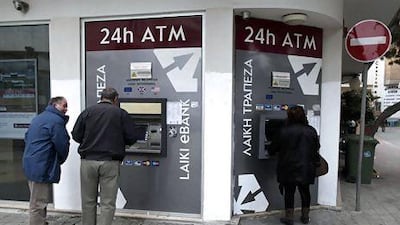Middle Eastern investors are primed to pull cash from Cyprus over fears of a controversial tax on deposits, according to currency traders.
Forex trading firms based outside the euro zone have reported inquiries from clients in the region as Middle Eastern firms seek to flee a depositor levy intended to pull Cyprus's banking system from the brink of collapse.
This past weekend, Cyprus announced a levy on deposits - also known as a bail-in - starting at 6.75 per cent on all bank deposits, with the rate rising to 9.9 per cent for those with more than €100,000 (Dh475,709) in savings.
The levy was intended to ensure that local depositors did not suffer at the expense of overseas banks and investors, many of them presumed to be Russian.
But the plan has been met with widespread protests and fears of a bank run as Cypriot savers rushed to withdraw their cash from ATMs.
Middle Eastern and Arabian Gulf investors were also showing "considerable concern" over whether they would be able to relocate deposits to avoid being hit, said Marc Aspinall, the global head of sales at ADS Securities, the Abu Dhabi-based forex brokerage.
"The Cypriot FX market accounts for a huge number of brokers," he said. "We've seen a significant number of FX brokers register themselves in Cyprus using it as an entrance to European markets."
Investors in the Middle East who had funds deposited with forex brokers in Cyprus were now trying to determine how to transfer accounts back to the region to avoid the levy, Mr Aspinall added.
Saxo Bank's Middle Eastern clients have also explored transferring accounts from Cyprus to outside the euro zone during the past few days, said Jakob Beck Thomsen, the bank's chief executive in the UAE.
"It is an unfortunate situation, and we are somewhat baffled by the game-changing decision in Cyprus," he said. "Saxo Bank is headquartered in Denmark, which is outside the euro zone. As such we have had a number of enquiries."
However, with banks closed for a bank holiday in Cyprus throughout the week, it was hard to tell whether capital flight would occur, Mr Thomsen added.
"The effect will only be truly evident over the coming days," he said.
Cyprus is seeking to raise €5.8 billion from its bank depositors to unlock €10bn in emergency loans from the IMF, European Union and European Central Bank, known collectively as the troika.
The country's lenders have been hammered by the effects of Greece's sovereign debt crisis, which led Athens to seek a bailout from the EU last year, becoming the fifth euro-zone country to do so.
But the troika is reluctant to provide fresh capital to Cypriot banks because of the political cost of making whole foreign depositors. Russian investors are able to use the country as a tax shelter because of a double-taxation agreement with Cyprus.
If Middle Eastern investors also withdraw capital from Cyprus, the result for the UAE's banking sector may be increased inflows of foreign capital to local banks.
Deposits by individuals and companies living outside the UAE rose substantially last year, especially during the first nine months.

